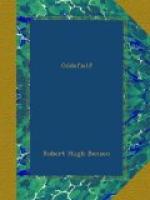Though, however, I was so determined, I did not dare to disobey the directions that his letter gave me; for I could not be sure that it was for this work in particular that he had summoned me; though I guessed that it was. I would go, thought I, and do in everything as he had said; I would ride through Amwell, with my servants behind at a good distance: I would see what befell me there—for that something would, was certain from the letter; then I would proceed on to London, and if the affair were against my honour, as I was sure it would be, I would refuse any further part in it. My one hardship was that I could do no more than tell Dolly in private that I would hold to my resolution. I dared not tell her anything of the contents of the letter which I had immediately destroyed. I promised her that I would be back for Christmas at the latest. She came out to the yard-gate to wish me good-bye: my servants were gone in front; and my Cousin Tom had the sense to be out of the way; so our good-byes were all that such miserable things ever can be. I waved to her at the corner, and she waved back.
When we came about two miles to the north of Amwell—which we did about eleven o’clock, as I had been bid, I bade my servants stay behind, and not come after me till half an hour later; further I bade them, if, when they came, they found me in any man’s company, neither to salute me nor to make any sign of recognition; but to pass straight on to Hoddesdon and wait for me there, not at the inn where I was known, but at another little one—the King’s Arms—at the further end of the village, and there they were to dine. Even then, when I came, if I did, they were not to salute me until I had spoken with them. All this I did, interpreting as well as I could, what Mr. Chiffinch had said; and they, since they were well-trained in that kind of service, understood me perfectly.
It was near half-past eleven when I came, riding very slowly, into the village street, looking this way and that so as to shew my face, but as if I were just looking about me. I noticed a couple of servants, in a very plain livery which I thought I had seen before, in the yard of the Mitre, but they paid no attention to me. So I passed up the street to the end, and no one spoke with me or shewed any sign. Now I knew that there was something forward, and that unless I fell in with it the arrangement would have failed; so I turned again and rode back, as if I were looking for an inn. Again no one spoke with me; so I rode, as if discontented, into the yard of the Mitre, and demanded of an ostler whether there was any food fit to eat there.
He looked at me in a kind of hesitation.
“Yes, sir,” he said; “but—but the parlour is full. A party is there, from London.”
Then I knew that I had been right to come; because at the same moment I remembered where I had seen those liveries before. They were those worn by the men who had come with Monmouth to Hare Street.




